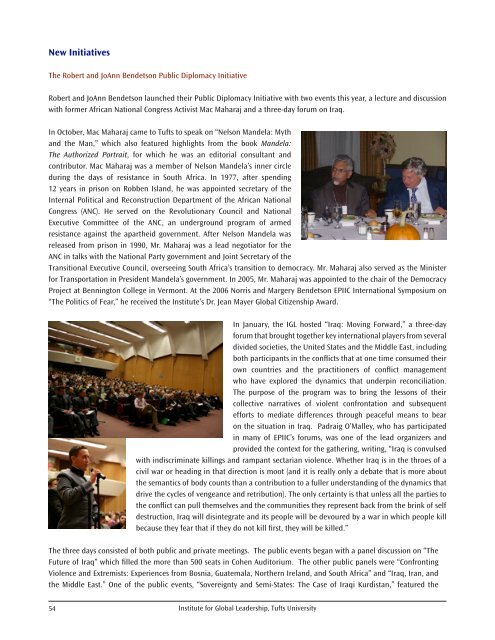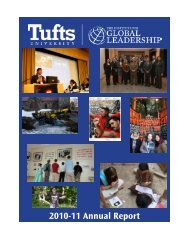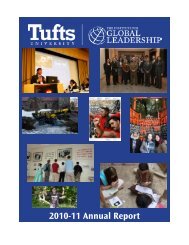Download - Institute for Global Leadership
Download - Institute for Global Leadership
Download - Institute for Global Leadership
Create successful ePaper yourself
Turn your PDF publications into a flip-book with our unique Google optimized e-Paper software.
New Initiatives<br />
The Robert and JoAnn Bendetson Public Diplomacy Initiative<br />
Robert and JoAnn Bendetson launched their Public Diplomacy Initiative with two events this year, a lecture and discussion<br />
with <strong>for</strong>mer African National Congress Activist Mac Maharaj and a three-day <strong>for</strong>um on Iraq.<br />
In October, Mac Maharaj came to Tufts to speak on “Nelson Mandela: Myth<br />
and the Man,” which also featured highlights from the book Mandela:<br />
The Authorized Portrait, <strong>for</strong> which he was an editorial consultant and<br />
contributor. Mac Maharaj was a member of Nelson Mandela’s inner circle<br />
during the days of resistance in South Africa. In 1977, after spending<br />
12 years in prison on Robben Island, he was appointed secretary of the<br />
Internal Political and Reconstruction Department of the African National<br />
Congress (ANC). He served on the Revolutionary Council and National<br />
Executive Committee of the ANC, an underground program of armed<br />
resistance against the apartheid government. After Nelson Mandela was<br />
released from prison in 1990, Mr. Maharaj was a lead negotiator <strong>for</strong> the<br />
ANC in talks with the National Party government and Joint Secretary of the<br />
Transitional Executive Council, overseeing South Africa’s transition to democracy. Mr. Maharaj also served as the Minister<br />
<strong>for</strong> Transportation in President Mandela’s government. In 2005, Mr. Maharaj was appointed to the chair of the Democracy<br />
Project at Bennington College in Vermont. At the 2006 Norris and Margery Bendetson EPIIC International Symposium on<br />
“The Politics of Fear,” he received the <strong>Institute</strong>’s Dr. Jean Mayer <strong>Global</strong> Citizenship Award.<br />
In January, the IGL hosted “Iraq: Moving Forward,” a three-day<br />
<strong>for</strong>um that brought together key international players from several<br />
divided societies, the United States and the Middle East, including<br />
both participants in the conflicts that at one time consumed their<br />
own countries and the practitioners of conflict management<br />
who have explored the dynamics that underpin reconciliation.<br />
The purpose of the program was to bring the lessons of their<br />
collective narratives of violent confrontation and subsequent<br />
ef<strong>for</strong>ts to mediate differences through peaceful means to bear<br />
on the situation in Iraq. Padraig O’Malley, who has participated<br />
in many of EPIIC’s <strong>for</strong>ums, was one of the lead organizers and<br />
provided the context <strong>for</strong> the gathering, writing, “Iraq is convulsed<br />
with indiscriminate killings and rampant sectarian violence. Whether Iraq is in the throes of a<br />
civil war or heading in that direction is moot (and it is really only a debate that is more about<br />
the semantics of body counts than a contribution to a fuller understanding of the dynamics that<br />
drive the cycles of vengeance and retribution). The only certainty is that unless all the parties to<br />
the conflict can pull themselves and the communities they represent back from the brink of self<br />
destruction, Iraq will disintegrate and its people will be devoured by a war in which people kill<br />
because they fear that if they do not kill first, they will be killed.”<br />
The three days consisted of both public and private meetings. The public events began with a panel discussion on “The<br />
Future of Iraq” which filled the more than 500 seats in Cohen Auditorium. The other public panels were “Confronting<br />
Violence and Extremists: Experiences from Bosnia, Guatemala, Northern Ireland, and South Africa” and “Iraq, Iran, and<br />
the Middle East.” One of the public events, “Sovereignty and Semi-States: The Case of Iraqi Kurdistan,” featured the<br />
54<br />
<strong>Institute</strong> <strong>for</strong> <strong>Global</strong> <strong>Leadership</strong>, Tufts University






